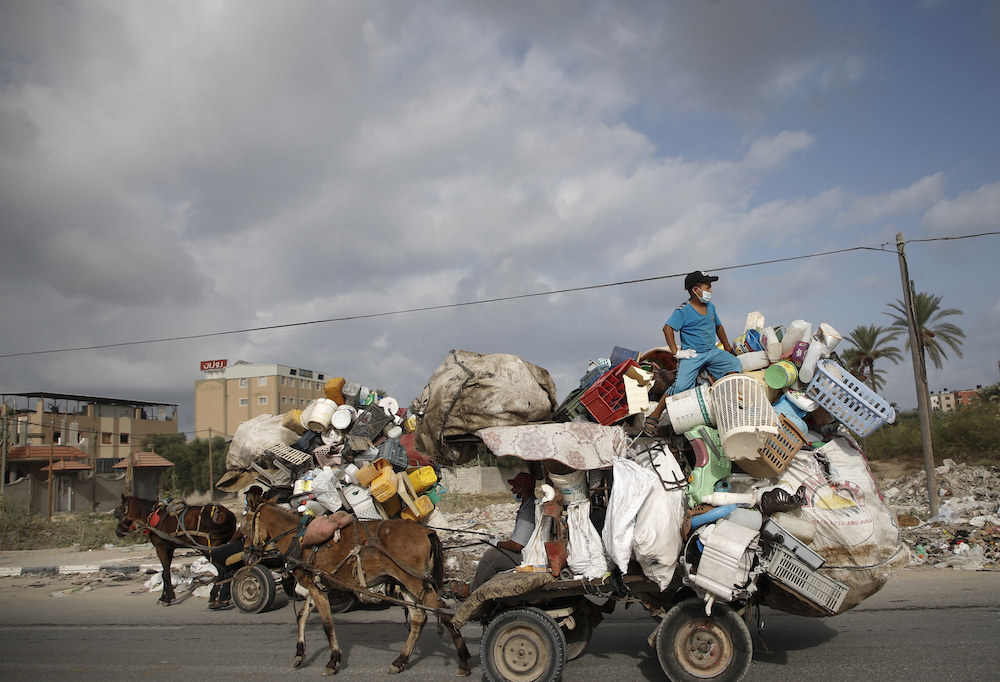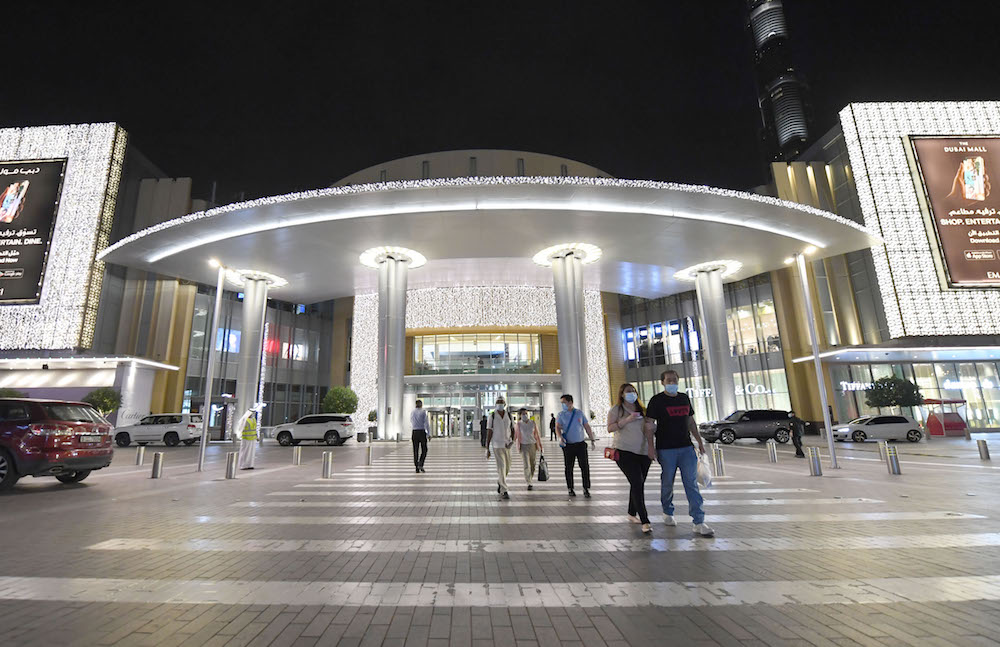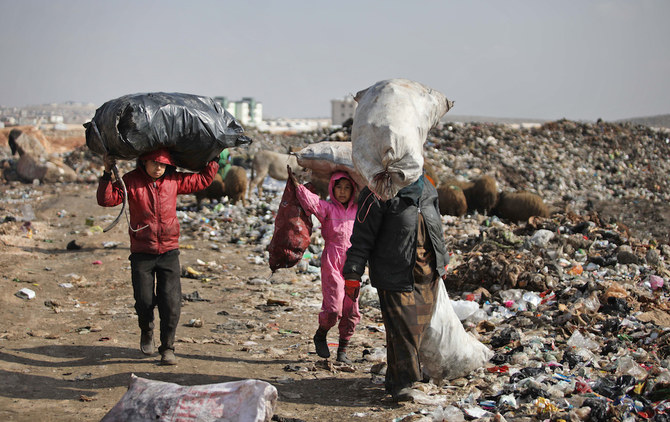DUBAI: Economically battered even before the COVID-19 crisis, the Middle East and North Africa (MENA) region is hard pressed to defy predictions of greater gloom.
Extended lockdowns, border closures and flight cancelations have exacerbated the economic pains of millions of skilled and unskilled laborers, mainly in middle- and lower-income countries, already struggling to meet daily needs.
With government measures to combat COVID-19 threatening to tip millions of people into poverty — hitting women, refugees, migrant workers and those in the informal economy the hardest — a huge increase in inequality is very likely, the international charity Oxfam said in a recent report.

A Palestinian man collects plastic containers on his horse cart while wearing a protective mask due to the COVID-19 coronavirus in Deir al-Balah in the central of Gaza Strip on October 1, 2020. (AFP)
“If another decade of pain is to be averted, governments need to take immediate action to reduce inequality through providing public services to protect ordinary people by taxing the richest and guaranteeing decent work.”
At the same time, the combined wealth of the rich in the Middle East and North Africa (MENA) increased by nearly $10 billion, more than twice the total emergency financing the region received from the International Monetary Fund to help it weather the global crisis, according to Oxfam, a confederation of nearly 20 charitable organization working to alleviate poverty around the world.
The pandemic has “exposed the lack of protection for the most vulnerable people in MENA, deepened the gap between the rich and the poor, and exacerbated the existing inequality in the region, said the report, entitled “For a decade of hope, not austerity, in the Middle East and North Africa.”
“Sometimes you have an idea of the size of the wealth and the inequality in the region, but when you are able to quantify some of these issues, this can be very important,” said Nabil Abdo, senior policy adviser and co-author of the Oxfam report, in an interview with Arab News from Beirut. “I think that is the important thing we did in this report.”
Based on nearly three months of research and data from government and international and regional organizations, the report focuses on four Arab countries — Egypt, Morocco, Jordan and Lebanon. Data on the region’s wealthy was based on Forbes magazine’s list.
“The coronavirus pandemic has exposed the lack of protection for the most vulnerable people in MENA, and will result in these people being even more vulnerable than they are already,” the report said.
“The impacts of the pandemic are expected to create a deep economic hole, out of which countries will have to climb. A fiscal deficit of 11.1 percent in regional GDP is expected, compared with 3.2 percent in 2019,” Oxfam said.
“Remittances, which constitute 5.7 percent of GDP, are expected to fall by almost 20 percent. Foreign investment is projected to drop by 45 percent, and an astonishing 1.7 million jobs expected to be lost — 700,000 held by women — with an estimated total loss of income of $42 billion. It is thought that more than 10 percent of working hours in the region were wiped out in the second quarter of 2020, equivalent to at least 8 million full-time jobs.”
The middle and working classes are expected to suffer the biggest hit, says the report, with the economic measures introduced to prevent the spread of the virus likely to push an additional 45 million people into poverty across the region.
“This will intensify the already huge inequalities found in MENA, where the richest 10 percent of the population control 76 percent of all income,” the report said.
The affluent were “untouched,” and their wealth has increased by at least $9.8 billion between March and August 2020, according to Oxfam.
Bridging the gap, Nabil Abdo says, requires a combination of policies. Foremost would be tax reforms in the form of a new “solidarity tax” on the net wealth of the extremely rich and a reduction in taxes levied on the poorest.
INNUMBERS
Impact of Coronavirus
* 45% Projected drop in MENA foreign investment.
* $42bn Estimated lost wages.
* 45m More people pushed into poverty across the region.
* 1.7m Expected job losses across MENA.
* 700,000 Estimated female job losses.
Other steps recommended by him include strengthening “weak” social protection nets; investing in public services including health, education and transportation; ensuring “dignified and decent work” with full rights such as leave and pensions for people and migrant workers; and relaxation in terms and conditions for loans to support small and medium enterprises.
Hussein Mohamed Suleiman, an economic researcher at Cairo’s Al-Ahram Center for Political and Strategic Studies, says new taxes on the wealthy is an idea worth exploring as long as it does not amount to excessive revenue collection.
“You have to be careful, or you might face capital (and) business flight. We are living now in an open world, so if you overtax businesses, they might go elsewhere, while you actually need them,” Suleiman told Arab News from Cairo.
“You have to avoid taxing corporate profits too much, and start taxing spending, such as in real estate, and personal wealth,” he said. “Some are proposing progressive consumption tax, not income tax. In other words, a wealthy person who earns a large amount of money is not taxed that much. But if he or she starts spending this money on luxuries, then it is taxed.”
In Egypt, the most populous country in the Arab region, COVID-19 has exacerbated the gap between the rich and the poor, which has been widening for the past three years in tandem with the implementation, in consultation with the IMF, of an economic reform program.
Egypt’s poverty rate, which had reached 32.5 percent in mid-2018, is believed to have risen since then. Unemployment is estimated at about 10 percent, but the situation might have worsened due to the pandemic’s impact on the country’s main income sources, namely tourism revenues, remittances from expatriates abroad and trade through the Suez Canal, which together traditionally have accounted for nearly 15 percent of Egypt’s GDP.
Though Egypt has tried to minimize economically damaging lockdowns, many parts of the world have stopped “sending tourists” or conducting trade through the Suez waterway.
Jordan, which introduced strict measures during the first six months of the pandemic, is also suffering. At least 15 economic sectors, including tourism facilities, transportation and meeting halls, are on the verge of complete shutdowns.

People wearing masks for protection against the coronavirus, leave the Mall of Dubai on April 28, 2020, after the shopping centre was reopened as part of moves in the emirate to ease lockdown restrictions imposed last month to prevent the spread of the COVID-19 illness. (AFP/File Photo)
Nearly 200,000 people have lost their jobs in a country where nearly 90 percent of the domestic economy is based on small and medium enterprises, according to economist and columnist Khaled Al-Zubeidy. “In June, the official unemployment percentage reached 23 percent, the highest in the history of the kingdom,” he told Arab News from Amman.
“Unemployment is accompanied by poverty, because those who don’t have jobs are inevitably poor. The gap between the rich, on the one hand, and the poor or extremely poor, on the other hand, has widened.” On the positive side, Al-Zubeidy said, businesses producing sanitizers, masks and disposable protective suits for health workers have flourished in recent months.
To bridge the rich-poor gap, the government must rationalize its expenses, especially those on non-essential goods and services. “In Jordan the annual budget is very large compared to the GDP, which is really odd,” Al-Zubeidy said.
“It is like someone who buys a shirt for 20 dinars and wears it with a suit that costs 2 dinars. One should not forget that Jordan’s foreign debt has reached $43 billion, which is equivalent to nearly 103 percent of its GDP.”
--------------------
Twitter: @jumanaaltamimi
















